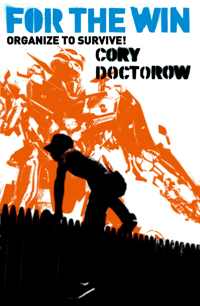Cory Doctorow’s latest novel, For the Win, travels from the industrial slums of India and China to posh American offices and into the fantasy world of online games. Writing the novel took Doctorow to new places as well.
Researching For the Win was different from his other books, according to Doctorow. Normally, he develops a passion for a subject and begins researching and blogging it on Boing Boing, a popular blog where he is one of the co-authors. Readers suggest other angles. “After some time, enough of this stuff crystallizes that I realize I’m writing a novel about it, and I end up writing the novel,” he said.
With For the Win, he started down that path, but realized he’d only just begun to research the subjects he needed, so he started a deliberate campaign, reading about 200 books on labor history, contemporary and historical China and India, histories of Mumbai, information about game theory, macroeconomics, neuroeconomics, and related subjects.
For the Win is a Young Adult novel, the story of a global band of teen-aged “gold farmers,” people who do drudge-work in online games, and sell the results of their work to players who are too lazy or busy to do the work themselves. The gold farmers are exploited in sweatshop-like computer boiler rooms in India and China. They organize a trade union to rise up and get better working conditions and pay from their bosses.
Doctorow is a blogger and Internet rights activist, and author of many science fiction novels, including Makers and Someone Comes to Town, Someone Leaves Town. I interviewed Doctorow for my podcast, Copper Robot. You can listen to the whole interview here: MP3. [For downloading, right click and “Save Target/Link As”]
 While researching the novel, Doctorow took notes in a flat text file on his computer, and tagged the notes with hashtags, as are used on Twitter. A reader wrote a script that turned the file into a tag cloud. “Whenever I came to a part where I said, ‘They’re dealing with police,’ and I knew I had some interesting bits about how the police force works in Mumbai, I could go look at my tag cloud and click on ‘police’ and explore through all the things that were related to police. I could hyperlink off to other subjects and so on,” Doctorow said.
While researching the novel, Doctorow took notes in a flat text file on his computer, and tagged the notes with hashtags, as are used on Twitter. A reader wrote a script that turned the file into a tag cloud. “Whenever I came to a part where I said, ‘They’re dealing with police,’ and I knew I had some interesting bits about how the police force works in Mumbai, I could go look at my tag cloud and click on ‘police’ and explore through all the things that were related to police. I could hyperlink off to other subjects and so on,” Doctorow said.
He interviewed economists, experts on China and India and labor, and present and past labor activists. He traveled to India and China and interviewed scholars. He interviewed gold farmers, academics who study gold farming, gamers, expatriates, people involved in manufacturing and labor politics. “I went to a lot of places, and I put all that stuff together. It probably took about eight months all told to do the research, and I was doing some of the writing at the same time,” Cory said.
In China and India, he got a native view of the country from people he knew through Boing Boing and professionally. “I knew people who knew people who could show me around places, which got me an accelerated and deeper view than I would have gotten if I’d just bought a plane ticket and flown over. I spent a month all told traveling in Asia,” Cory said. He traveled to the Pearl River Delta in China and visited three cities there, as well as Mumbai, and Pune, a city very close to Mumbai. “I really worked my contact networks to get me around there, and also worked my friends who lived there and were from there, to get them to do reality checks on the work after I was done with it.”
He added, “It’s interesting—just like there is no one New York that is well and truly New York, that everybody would agree is the right New York, there is no one Shenzhen, and no one Pune, and no one Mumbai.” Cory’s indigenous experts, both expatriates and still living there, disagreed with each other about what rang true. “Someone would say, ‘Absolutely, this is characteristic of what life is like in Mumbai,’ and then another one would say, ‘This never happens in Mumbai.’ But both of them were right, because both of them move in different orbits.”
I asked Cory how he researched the gaming elements of the book. Is he a gamer?
“For anyone who’s my age and uses computers, you would have to undertake an extraordinary effort not to be a gamer,” he said. He started computer games at age 8, when a neighbor got Pong, and they became obsessed with the game.
“We think you’ve got to be somebody who spends 70 hours a week playing World of Warcraft in order to call yourself a gamer,” Cory said. However, that’s not true, he said. Likewise, most people think of gamers as either being children or overgrown children, but 50% of FarmVille players are 50-year-old women with high school diplomas, Doctorow said.
Cory has played a wide variety of online games. “More importantly, I live with a gamer, so I have a kind of outsourced gamer in the house. My wife actually played Quake on the English team, she played Quake internationally on the national team.” His wife, Alice Taylor, commissioned games for Channel 4, the public broadcasters in the UK, and two of the games won best game and best educational game awards at South by Southwest recently. She edits the gamer blog Wonderland.
“I’m in a gamer’s orbit all the time. I don’t spend a lot of time killing zombies in Left for Dead, but I spend a lot of time watching zombies get killed in Left for Dead, and listening to it happening, and thinking critically about what it means,” Cory said.
Read more of my interview with Doctorow here: Digital revolution hits the slums of India and China in Cory Doctorow’s For the Win.
Mitch Wagner is a fan, a freelance technology journalist and social media strategist. Follow him on Twitter: @MitchWagner.
Photo by Joi Ito (joi.ito.com), licensed CC-BY










